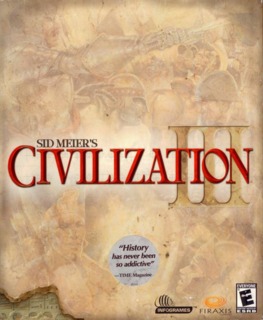A great game with some minor flaws.
Being a fan of the Call to Power games, I was disappointed to see that they went back to the “original” Civilization time system, with the game ending in 2050, instead of continuing into the future and building underwater cities and studying futuristic technologies. I know this game was trying to get “back” to the classic Civ system, but overall I was disappointed with this happening.
Strategy-wise this game is a whole lot more realistic, and somewhat more challenging. It really forces you to be careful about what order you study your technologies, to expand quickly, and to wage war with neighbors. Also, they’ve added in a system where some units require “resources” to build. So if you want to build a mounted unit, you have to have access to horses. Generally these resources are easy to find, so this isn’t much of a problem.
Another major set of things that were added were the “special unit” and “civilization traits.” These make each civilization have certain advantages and disadvantages by giving each civilization one unit that only they can build, and two special traits, such as Militaristic, Religious, Expansionist, Scientific, or Commercial. So, the Germans, who are Scientific and Militaristic are able to build Barracks and Libraries/Universities for cheaper, along with having several smaller advantages.
Another large addition was “culture.” Basically every city has “culture points” that are generated from buildings such as temples, libraries, and universities, and also from most wonders. As the cultures for your cities grow, your area of control grows. Other civilizations cannot build inside your culture area, so this system allows you to prevent other civilizations from putting their cities in annoying places on your island. However, when a city is captured by an enemy, all of the culture resets, and starts over from 0. Also, if there are two cities, each from different civilizations, side by side, and one has much more culture, the one with lower culture has a chance of “defecting” and joining the other civilization’s side, in “awe” of their culture. The chances of this are affected by the difficultly level. If it is Chieftain, you shouldn’t have any problem taking other cities this way, and enemies can rarely pull it on you. On the other hand, if you are deity, it is nearly impossible for you to do this to you enemies, but they can do it to you quite well. The final part of the “culture” system, is the fact that you can win the game by amassing huge amounts of culture in one city, or having several times more culture than any other civilization.
The graphics are a definite improvement. Civ: Call to Power II had excellent graphics, but this time the graphics have an unparalleled amount of realism, in both the unit graphics and the terrain detail. This is also coupled with realistic sound effects and a beautiful soundtrack to create a very pleasant gaming experience. And of course, if you don’t like the music, it’s not to hard to turn it off in the sound menu.
Overall, I’m happy to say, that even with a few shortcomings, Civilization is quite an enjoyable sequel to this amazing series. Definitely a game for Civ fans to buy, or even people interested in getting into the game.

